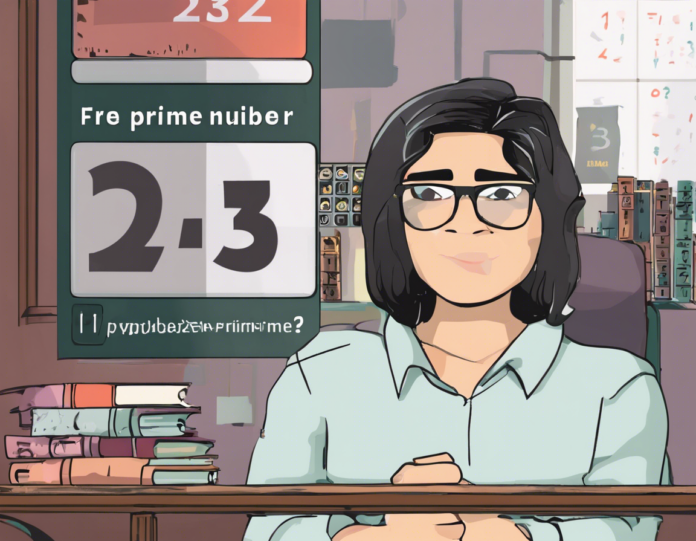In mathematics, prime numbers hold a special place as they are numbers that are only divisible by 1 and themselves. Determining whether a number is prime can sometimes be confusing, especially when dealing with larger numbers. In this post, we will explore the concept of prime numbers in detail and specifically answer the question – Is 23 a prime number?
What Is a Prime Number?
- A prime number is a natural number greater than 1 that is only divisible by 1 and itself.
- Prime numbers have exactly two distinct factors, namely 1 and the number itself.
- Examples of prime numbers include 2, 3, 5, 7, 11, 13, 17, 19, and so on.
The Case of 23
Now, let’s focus on the number 23 to determine if it is a prime number. To do so, we need to check if 23 has any divisors other than 1 and 23 itself.
To find out if 23 is prime, we can perform a simple check by dividing 23 by all numbers starting from 2 up to the square root of 23 (which is approximately 4.795), and see if it has any divisors. If any such divisors are found, then 23 would not be a prime number.
Is 23 Divisible by 2?
When we divide 23 by 2, we get a quotient of 11 with a remainder of 1. Since 23 is not evenly divisible by 2, it does not have 2 as a factor. Therefore, 23 passes the test for divisibility by 2.
Is 23 Divisible by 3?
When dividing 23 by 3, the quotient is 7 with a remainder of 2. Since 23 is not divisible by 3, it does not have 3 as a factor. Therefore, 23 passes the test for divisibility by 3 as well.
Is 23 Divisible by 5?
Checking for divisibility by 5, we find that when 23 is divided by 5, the quotient is 4 with a remainder of 3. Hence, 23 is not divisible by 5 which means it doesn’t have 5 as a factor. Therefore, 23 passes the test for divisibility by 5.
Is 23 Divisible by 7?
When dividing 23 by 7, the quotient is 3 with a remainder of 2. Therefore, 7 is not a divisor of 23, and 23 passes the test for divisibility by 7 as well.
Conclusion – Is 23 a Prime Number?
After checking divisibility up to the square root of 23, it can be concluded that 23 is only divisible by 1 and 23 itself. Since it does not have any other divisors, 23 is indeed a prime number.
Properties of Prime Numbers
- Prime numbers are the building blocks of all natural numbers, as any integer greater than 1 can be expressed as a product of prime numbers (fundamental theorem of arithmetic).
- There is an infinite number of prime numbers, a theorem proved by the ancient Greek mathematician Euclid.
Why Are Prime Numbers Important?
- Cryptography: Prime numbers play a crucial role in modern encryption techniques used to secure sensitive information in communication and online transactions.
- Number Theory: Prime numbers are fundamental in number theory and have applications in various mathematical problems and puzzles.
- Computing: Prime numbers are also used in algorithms, data structures, and computing in general.
Frequently Asked Questions (FAQs) About Prime Numbers
- What is the smallest prime number?
-
The smallest prime number is 2.
-
Are there even prime numbers other than 2?
-
No, all prime numbers greater than 2 are odd.
-
Is 1 a prime number?
-
No, 1 is not considered a prime number because it only has one factor (1 itself), whereas prime numbers should have exactly two factors.
-
How many prime numbers are there between 1 and 100?
-
There are 25 prime numbers between 1 and 100.
-
Can prime numbers be negative?
-
No, by definition, prime numbers are natural numbers greater than 1. Negative numbers are not considered prime.
-
What is the largest known prime number?
-
The largest known prime number as of now is 2^82,589,933 – 1, a number with 24,862,048 digits discovered in December 2018.
-
Do prime numbers follow any pattern?
-
Prime numbers do not follow a specific pattern, which is why they are considered one of the most fascinating topics in mathematics.
-
Can prime numbers be composite numbers too?
-
No, by definition, prime numbers are only divisible by 1 and themselves. Composite numbers have more than two factors.
-
Are there any prime numbers between every set of consecutive squares?
-
Yes, there is at least one prime number between every set of consecutive squares, a result known as Bertrand’s Postulate.
-
Do prime numbers play a role in cybersecurity?
- Yes, prime numbers are essential in cybersecurity as they form the basis of encryption algorithms used to secure data and communications.
In conclusion, prime numbers like 23 are a fascinating aspect of mathematics, with applications ranging from number theory to modern cryptography. Their unique properties and role in mathematics make them a subject of continued interest and research in the field.

